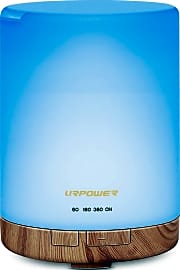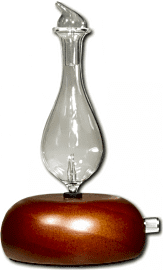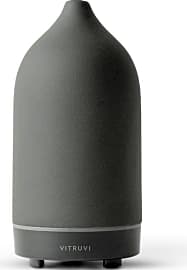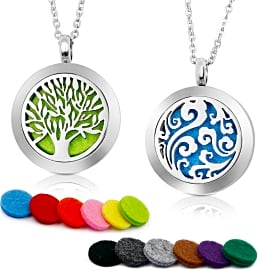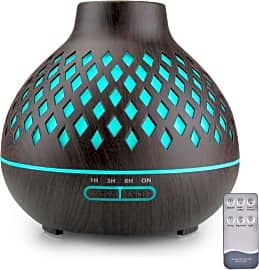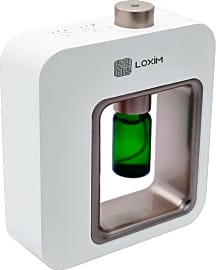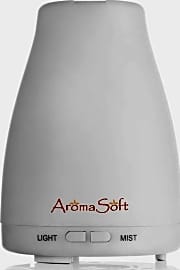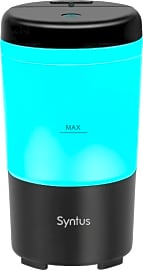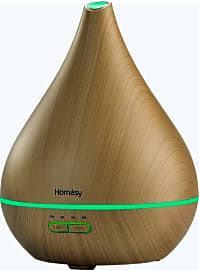The 10 Best Oil Diffusers

This wiki has been updated 47 times since it was first published in February of 2015. If you are one of the many people who swear by the rejuvenating effects of aromatherapy, you're probably familiar with essential oils. Our selection of diffusers can add a touch of relaxing fragrance to your day, and we've included models suitable for bedrooms, vehicles, spas, and yoga studios. Just be careful when using these in a home with pets, as some oils may be harmful to your furry friends. When users buy our independently chosen editorial picks, we may earn commissions to help fund the Wiki.
Editor's Notes
February 24, 2021:
Oil diffusers come in a wide range of styles, looks, and sizes. Features that are important to some users may seem frivolous to others. Because of this, we made sure to keep variety in mind during this update.
New to the list, the Sierra Modern Home Smart can connect to wifi, allowing users to change the settings using either their phone or a smart speaker like Amazon Alexa or Google Home. This model can also be set to a daily or weekly schedule, so you can set it to turn on before you get home from work or have it turn off at a set time each night.
If you want remote control but don't like to deal with "smart" technology, the Dekugaa Vaporizer is a good choice. Its six-button remote can control both the mist level and the light and it has a seperate power button for quickly turning the whole unit on or off.
The Urpower Ultrasonic is a no-fuss model that's good for those who don't want to deal with extra bells and whistles. Its two buttons control the light and mist separately. One downside to this is the fact that you have to cycle through each option every time, rather than having a way to turn the unit on or off instantly. Still, the unit overall is a reliable option with a relatively low price.
On the more high-end side, we have the Vitruvi Stone. We included this ceramic unit for those who don't think a plastic exterior will work well with their decor. Unlike many other options, its indicator light is located in the back, so it won't be a distraction in a dark or dimly-lit room or studio.
Nebulizing diffusers, like the Aromis Orbis Nox Merus and newly-added Minidiva Loxim work without the use of water. This is a pro if you live in a wetter climate or want to avoid mildew but a drawback if you want a model that doubles as a humidifier.
If you want to have a model that you can take with you wherever you go, the RoyAroma Pendant is a truly portable option that can fit in a pocket and doesn't require any electricity. It's meant to be worn as a necklace, but it can also double as a car air freshener if you're not into jewelry. It comes in a pack of two, so you can keep the extra as a backup or gift it to a friend.
Essential oils may be natural, but that doesn't mean that they can't have side effects. You should always talk to your vet before using an oil diffuser in a room that your pet has access to, as many types of oils can be harmful to animals. And humans can have allergies to the various herbs used in these oils as well, so if you ever suspect that you're having a reaction, stop using oils and contact your doctor.
November 07, 2019:
The diffusers in this list do more than just make your home or office smell good. They also serve as mini humidifiers and can make dry spaces feel much more comfortable, and some of the devices we've picked out have color-changing LED lights that provide a little bit of ambiance, too. The models featured here have multiple timer settings that make it possible to set it and forget it, as they say. Additionally, they're all compatible with every type of essential oil out there, so you don't have to worry about having to purchase brand-name cartridges, wax melts, and the like just to get your diffuser up and running. All you have to do is add water and a few drops of your favorite oil.
The Zeigga Lab Pink and Homesick Ultrasonic are the list's newest additions, chosen for their elegant designs, solid performance records, and overall popularity among users. The VicTsing Essential has been removed and replaced with an updated version, the Homasy Aroma.
Special Honors
Ellia Imagine With a fairly high capacity for a cordless model, this is a good choice for those who want to bring scent into an area that isn't close to an outlet. Its glass dome is available in two colorways: blue and iridescent. ellia.com
Doterra Pilot This portable option comes with a carrying case that has tiny pouches that can fit the power adapter as well as three bottles of essential oils, in addition to the diffuser of course. Fully charged, it can provide up to four hours of continuous mist, or 8 hours on the intermittent setting. doterra.com
5 Questions To Ask Yourself Before Choosing An Oil Diffuser
Check the descriptions before you buy to make sure that if there is a light with the diffuser, it can be switched off if and when you prefer not to use it.
Here are important questions you need to ask yourself in order to choose your perfect oil diffuser:
1. Do you want aromatherapy - or just the aroma? As discussed in the first video we've shared above, to make the most of the therapeutic benefits of your essential oil - rather than just the refreshing scent - you probably want to use either a nebulizing or an ultrasonic diffuser. All of the diffusers we've rated on this site fall into one of those two categories, so this is a great place to start!
2. Do you also want to use your diffuser as a humidifier? Because ultrasonic diffusers use water to disperse the essential oils, they also have the added benefit of reducing dryness in the air. Particularly during colder weather, this can have benefits for your skin in particular, but can also help to reduce snoring and possibly even nose bleeds.
3. Where are you going to use your diffuser? This is important for three reasons: one is the size of the space, because nebulizing diffusers like our top-rated choice, the Aromis Orbis Nox Merus, are much better than other varieties at dispersing essential oil throughout larger spaces.
Secondly, if your diffuser is for use in your bedroom, you're going to want one that operates quietly - see our article below for more advice on using an oil diffuser to create a relaxing atmosphere in your bedroom.
The third reason is more subjective: take some time to consider which room in your home is going to be the setting for your oil diffuser, and then you can pick a diffuser that looks right with your furnishings and color scheme.
4. How are you going to ensure the diffuser is used safely? Look for a diffuser that comes with a timer feature (for nebulizing diffusers), or an automatic shut-off function when the water inside runs out (for ultrasonic diffusers). Most if not all of the diffusers we've rated here come with one of these features.
5. What about optional extras? A lot of the diffusers we've rated here come with lighting effects - these can be especially nice if your diffuser is for a child, or if you're using it to create a relaxing spa effect. Some users, however, find these lights distracting, especially if the diffuser is for use at bedtime. Check the descriptions before you buy to make sure that if there is a light with the diffuser, it can be switched off if and when you prefer not to use it.
If, like many consumers, you're keen to reduce your energy usage for financial and/or environmental reasons, then check out our list for diffusers that promise to use an energy-efficient mechanism.
Get A Perfect Night's Sleep With Help From Your Oil Diffuser
The health benefits of aromatherapy are the subject of much debate. But here are a couple of things we can all agree on:
- Getting enough sleep is hella important. If you've not watched Arianna Huffington's TED talk about the benefits of sleep, get on it.
The health benefits of aromatherapy are the subject of much debate.
- You can help ensure you get a better night's sleep by optimising your bedroom environment and your bedtime routine - check out steps 2 and 3 in this article from the Division of Sleep Medicine at Harvard Medical School.
So let's get started with that bedtime routine. When you switch off all your devices before bed, you could get into the habit of switching on your diffuser instead. Load it up with an essential oil recommended to aid sleep, such as lavender.
Next you need to think about your sleep environment. Ideally, your bedroom should be as dark as possible, but if you find a little light relaxing - maybe you'd like to read awhile before you go to sleep - pick a diffuser that lights up in soft colors.
Finally, your bedroom needs to be a quiet place. The mechanism in some ultrasonic diffusers can be a little noisy, so be sure to pick a quiet model - check out our list above for diffusers that promise to let you sleep in peace.
Six Thousand Years Of Essential Oils: A Brief History
Humans have been using plants for their healing properties for almost as long as we've existed, and we can trace the use of essential oils back almost 6000 years. Here are just a few highlights from that long and brilliant career:
The Ancient World - Ancient civilizations including the Egyptians were using essential oils as early as 4500 B.C.E.
In China, the legendary Yellow Emperor Huangdi wrote The Yellow Emperor’s Book of Internal Medicine, which incorporates the use of aromatic oils, between 2697-2597 B.C.E.
Here are just a few highlights from that long and brilliant career:
Essential oils are also an essential (sorry...to be honest you're lucky that's the first time we've used that pun on this site) part of ayurvedic medicine, an Indian tradition with a 3000-year history.
Hippocrates, the father of modern medicine, wrote about the benefits of many plants still used today in essential oil form, such as thyme and peppermint.
Modern Times - It was in the 20th century that the use of essential oils came to be referred to as 'aromatherapy': the word first appeared in print in 1937, in a French book called Aromathérapie: Les Huiles Essentielles, Hormones Végétales, by a chemist called René-Maurice Gattefossé.
Gattefossé had begun to analyze the chemical properties of essential oils and their use during the First World War - treating burns, skin infections, gangrene and even wounds - after his own first-hand experience, figuratively: an explosion in his laboratory burned his hand and he claimed to have treated it successfully using lavender oil.
Another French man - a surgeon called Jean Valnet - continued the medicinal use of essential oils by employing them as antiseptics during the Second World War.
By the 1950s essential oils had become established tools of the trade for many professionals, including massage therapists, beauticians and some health care providers, and this continues to this day.


